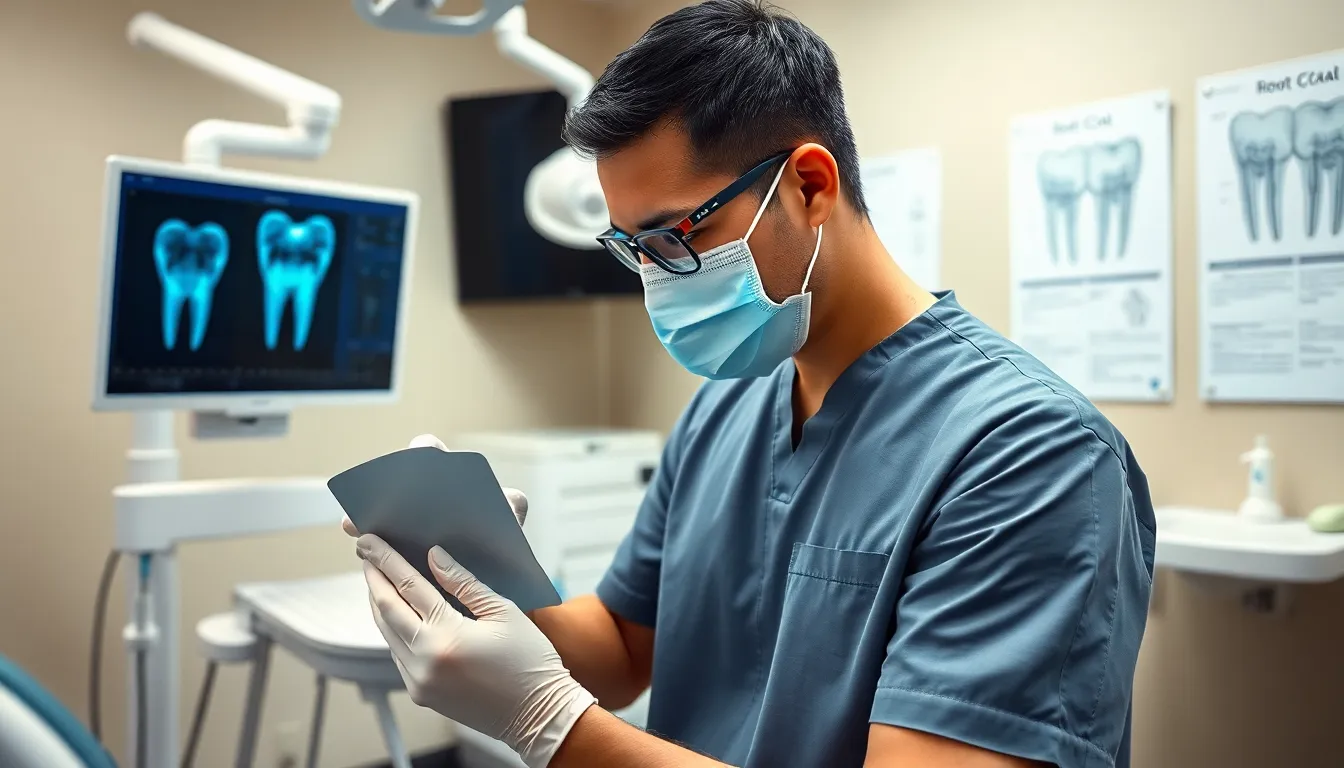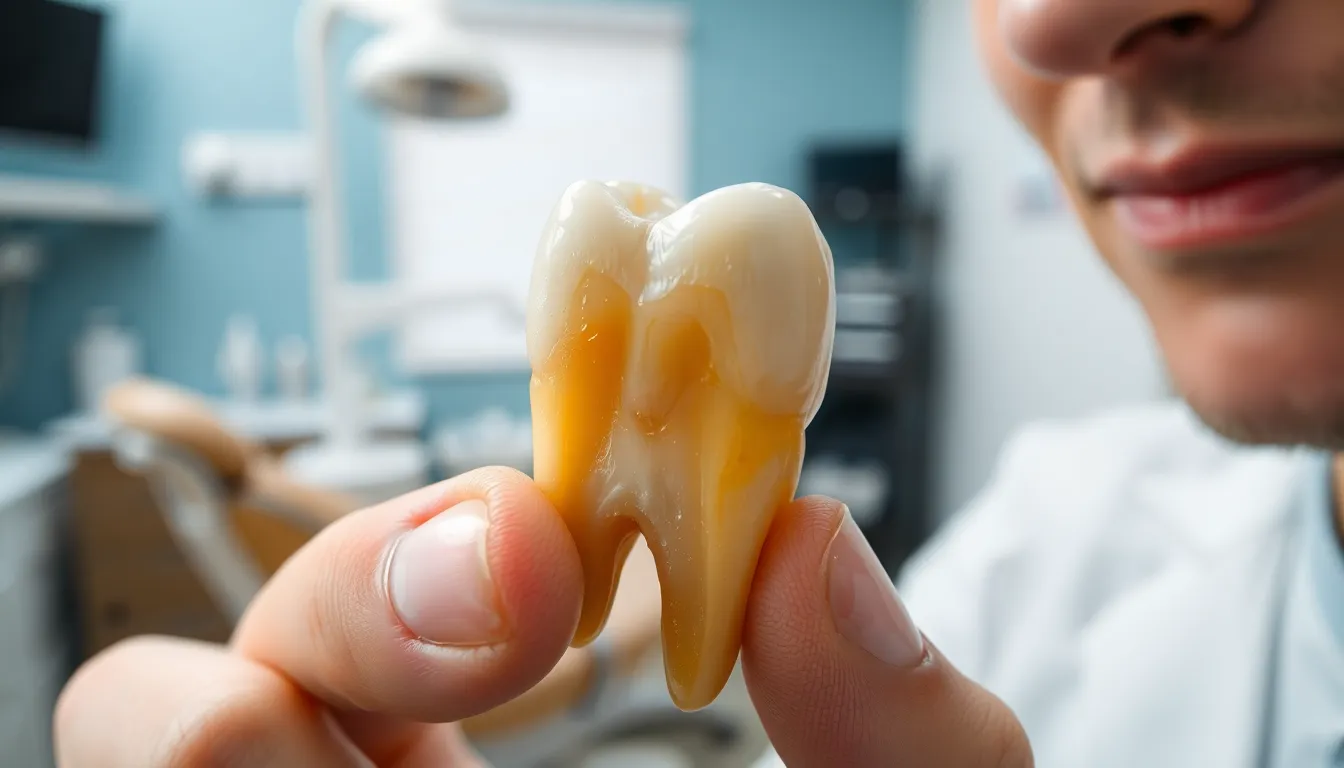Wondering if endodontists do crowns? While endodontists specialize in saving your natural teeth through root canal procedures, they typically don’t place permanent crowns. Instead, they focus specifically on treating the inside of your tooth—the dental pulp and roots.
When you need a root canal, your treatment journey often involves two dental professionals working together. Your endodontist will perform the specialized root canal therapy to eliminate infection and save your tooth. Then, you’ll return to your general dentist for the permanent crown that protects and restores your tooth’s function and appearance. This teamwork approach ensures you receive the most specialized care at each treatment stage.
Understanding the Role of Endodontists in Dental Care
Endodontists are dental specialists who focus exclusively on treating the inside of teeth. These highly trained professionals complete an additional 2-3 years of specialized education beyond dental school, mastering advanced techniques for diagnosing and treating tooth pain and performing root canal treatments. Their expertise centers on maintaining teeth through endodontic therapy—procedures that involve the soft inner tissue called pulp.
When patients visit an endodontist, they’re typically referred by their general dentist for a exact problem requiring specialized care. Endodontists use cutting-edge technologies like digital imaging, operating microscopes, and ultrasonic instrumentation to treat complex conditions affecting the tooth’s interior. Their primary goal is saving natural teeth whenever possible, which often involves removing infected pulp, cleaning the inner chambers, and sealing the space to prevent future infection.
Dr. Todd B. Harris explains, “I often see patients who are confused about who handles which aspects of their dental care. Just last month, a patient named Sarah came to me after her general dentist referred her for root canal therapy. She assumed I’d also be placing her crown afterward and was surprised to learn she’d need to return to her regular dentist for that final restoration step.”
Endodontists don’t typically perform restorative procedures like placing permanent crowns, veneers, or bridges. Their specialized training and equipment are optimized for treating the root canal system rather than creating and fitting permanent restorations. This clear division of responsibilities ensures you receive the highest level of expertise at each stage of your treatment journey—specialized endodontic care from an endodontist and restorative work from your general dentist.
The Difference Between Endodontists and General Dentists

Endodontists and general dentists serve distinct roles in your dental care journey. While both are dental professionals, they focus on different aspects of oral health and perform separate procedures based on their training and expertise.
Specialized Training of Endodontists
Endodontists complete an additional 2-3 years of specialized education after dental school, focusing exclusively on diagnosing and treating issues related to the tooth pulp and roots. This advanced training equips them with expertise in root canal therapy, retreatment procedures, and complex tooth preservation techniques. General dentists, in contrast, receive broader training covering preventive care, fillings, extractions, and basic restorative procedures. Dr. Todd B. Harris often explains to patients, “Think of us as the specialists who save your natural tooth from the inside out, focusing solely on the root system while your general dentist manages the comprehensive care of your smile.”
Scope of Practice Limitations
Endodontists typically don’t perform crown preparations or placements after completing root canal treatment. Their expertise centers on treating the internal structures of teeth—removing infected pulp, cleaning canals, and sealing the tooth interior. After this specialized treatment, patients return to their general dentist for external restoration with a crown. General dentists handle the crown process, including tooth shaping, taking impressions, and fitting the permanent restoration. Many patients express surprise at this division of responsibilities, assuming the same doctor who performs their root canal will also place their crown. The collaboration between these dental professionals ensures you receive specialized care at each treatment stage, maximizing both expertise and outcomes for your dental health.
Do Endodontists Perform Crown Procedures?

Endodontists specialize specifically in root canal treatment and typically don’t place permanent crowns. They focus on treating the interior of your tooth by removing infected pulp, cleaning the canals, and sealing them to prevent further infection. After completing this specialized treatment, your endodontist will refer you back to your general dentist for the final restoration.
When Endodontists May Place Temporary Crowns
Temporary crown placement occasionally falls within an endodontist’s scope of practice. After completing your root canal treatment, the endodontist might place a temporary crown to protect your tooth structure until you can see your restorative dentist. These interim restorations prevent contamination of the treated area and safeguard the remaining tooth structure during the transitional period. Dr. Todd B. Harris explains, “Many of my patients are surprised to learn that we sometimes place temporary crowns to protect their investment in root canal therapy until they can return to their regular dentist for permanent restoration.”
Why Permanent Crowns Are Usually Left to Restorative Dentists
Permanent crown procedures require specialized training in prosthodontics and esthetic restoration techniques that restorative dentists possess. Your general dentist has the necessary equipment and expertise to handle multiple crown placement steps, including:
- Filing down the tooth to create space for the crown
- Taking precise impressions or digital scans
- Selecting appropriate materials and matching tooth color
- Cementing the final crown securely in place
Restorative dentists use either traditional laboratory processes or modern same-day milling technologies to create permanent crowns that fit perfectly and function naturally. This division of responsibilities ensures you receive specialized care at each treatment stage, with endodontists focusing on saving your tooth through internal treatment while restorative dentists concentrate on restoring its function and appearance with a permanent crown.
The Typical Treatment Process Following Root Canal Therapy

Root canal therapy follows a exact sequence of steps that transitions from endodontic treatment to final restoration. Understanding this process helps patients navigate their treatment journey with realistic expectations about timing and procedures involved.
Coordination Between Endodontists and Restorative Dentists
Endodontists and restorative dentists work as a coordinated team to ensure your tooth receives complete care. The endodontist’s role focuses exclusively on saving your tooth by performing the root canal procedure, removing infected pulp, and filling the canals with gutta-percha. After completing this specialized treatment, they place a temporary filling to protect the tooth until you visit your restorative dentist. Your general dentist then takes over, preparing the treated tooth for crown placement and completing the restoration process. This teamwork creates a seamless treatment experience that capitalizes on each specialist’s expertise.
“Patients often express surprise when I explain that I won’t be placing their permanent crown,” says Dr. Todd B. Harris. “I recently treated Sarah, who assumed her root canal and crown would be completed in a single visit. I explained that by focusing solely on root canal procedures, I can provide the highest level of specialized care for the internal portion of her tooth, while her dentist would apply their expertise in creating a perfectly fitted crown for long-term protection.”
Timeline From Root Canal to Crown Placement
The complete treatment process typically spans several weeks from initial root canal to final crown placement. Root canal therapy usually requires 1-2 visits with your endodontist, depending on the complexity of your case. Following your endodontic treatment, you’ll schedule an appointment with your restorative dentist for crown preparation, which involves reshaping the tooth and taking impressions or digital scans. Crown fabrication takes 2-3 weeks when sent to a laboratory, though many practices now offer same-day crowns using CEREC or similar digital milling technology. Your dentist will permanently cement the crown during a follow-up appointment, fully restoring your tooth’s function and appearance.
During this transitional period between specialists, your tooth remains protected by the temporary filling or temporary crown placed by your endodontist. Prompt follow-up with your restorative dentist minimizes the risk of complications and ensures your treated tooth receives timely permanent protection against fracture and reinfection.
How to Choose the Right Dental Professional for Your Crown

Selecting the appropriate dental professional for your crown placement is crucial for ensuring optimal results after endodontic treatment. The right choice depends on your exact case complexity and restoration needs.
Questions to Ask Your Endodontist About Restorative Work
During your endodontic consultation, asking exact questions helps clarify the treatment process and expectations. Your endodontist can provide valuable information about the post-treatment restoration plan.
“Will you be performing only the root canal treatment, or will you also place the crown?” This question clarifies the scope of your endodontist’s involvement in your treatment.
“Do you recommend a post to help support the crown due to my tooth’s condition?” Posts provide additional structure for severely damaged teeth and may be necessary before crown placement.
“If you don’t place crowns, who will handle the crown placement afterward?” Understanding the referral process ensures seamless transition between specialists.
“How soon after the root canal should I have the crown placed?” Timing is critical—most endodontists recommend crown placement within a few weeks to protect the treated tooth from fracture.
“What type of crown material do you recommend for a tooth that has had a root canal?” Different materials offer varying benefits in terms of strength, appearance, and longevity.
Dr. Todd B. Harris often shares that patients express relief when given clear guidance about the restoration process. “I had a patient who was anxious about coordinating between different dental professionals,” he recalls. “After explaining that her general dentist would handle the crown placement while I focused on saving her tooth through root canal therapy, she appreciated the specialized attention each aspect of her treatment would receive.”
For complex cases—such as teeth with multiple roots, failed previous treatments, or those requiring surgical intervention—an endodontist’s expertise is invaluable before crown placement. Meanwhile, prosthodontists specialize in creating custom crowns for cases demanding high aesthetic or technical precision.
Cost Considerations for Root Canal and Crown Procedures

Root canal therapy and crown placement involve separate procedures with distinct costs. When you need a root canal, an endodontist removes infected pulp, cleans the canals, and seals the space—all specialized services that come with their own fee structure. These costs vary based on the complexity of your case and your geographic location.
Crown placement follows as a separate expense handled by your general dentist or prosthodontist. Pricing for crowns depends on several factors including the material chosen (porcelain, ceramic, or metal), the condition of your tooth, and whether you’ll need temporary crowns during the fabrication period.
“Patients are often surprised to learn they’re paying for two distinct procedures,” notes Dr. Todd B. Harris. “I recently treated a patient who assumed the root canal fee included the crown. Explaining the division of care helped her understand why separate billing occurs and allowed her to better plan financially.”
Dental insurance typically offers partial coverage for both treatments, though benefits vary significantly between plans. Many insurance providers classify root canals as major procedures, covering 50-80% of the cost, while crowns might be covered at a similar rate but with annual maximums that can limit reimbursement.
The combined expense of both procedures represents an investment in saving your natural tooth. Without a crown after root canal treatment, the tooth becomes increasingly brittle and susceptible to fracture, potentially requiring extraction and more costly replacement options like implants or bridges down the road.
Before beginning treatment, request a detailed breakdown of all anticipated costs from both your endodontist and restorative dentist. Many dental offices offer payment plans or financing options to make these necessary procedures more affordable, spreading the expense over several months rather than requiring full payment upfront.
Conclusion
Understanding the distinct roles of endodontists and general dentists helps you navigate your dental treatment journey more effectively. While endodontists excel at saving your natural teeth through specialized root canal procedures they don’t typically place permanent crowns.
This collaboration between specialists ensures you receive expert care at each treatment stage. Your endodontist focuses on addressing the internal tooth issues while your general dentist handles the restoration with a crown.
When planning your treatment remember to discuss the complete process with both dental professionals ask about timing and coordinate appointments accordingly. This teamwork approach eventually provides you with the highest quality care protecting your oral health for years to come.
Frequently Asked Questions
Do endodontists place crowns after root canals?
No, endodontists typically don’t place permanent crowns. They specialize in root canal procedures, treating the inner parts of teeth. After completing the root canal, they usually place a temporary filling. You’ll then return to your general dentist for the permanent crown placement. This collaboration between specialists ensures you receive expert care at each treatment stage.
How long does the entire root canal and crown process take?
The complete process typically takes several weeks. The root canal procedure itself is usually completed in 1-2 appointments with the endodontist. After this, you’ll visit your general dentist for crown preparation. Crown fabrication typically takes 2-3 weeks at a dental laboratory, unless your dentist offers same-day crowns. The entire treatment journey from root canal to final crown placement usually spans 3-4 weeks.
What’s the difference between an endodontist and a general dentist?
Endodontists are specialists who complete 2-3 additional years of training beyond dental school, focusing exclusively on diagnosing and treating tooth pulp and root issues. They perform complex procedures like root canals using advanced techniques and technology. General dentists provide broader care including preventive services, fillings, crowns, and other restorative procedures. Think of endodontists as specialists (like cardiologists) and general dentists as primary care providers.
Will I receive a temporary crown after my root canal?
It depends. Some endodontists place temporary crowns to protect the tooth until you can see your general dentist, while others simply place a temporary filling. This temporary protection helps prevent contamination and damage to the treated tooth. Your endodontist will inform you about the specific temporary restoration they’ll use and provide care instructions until you can receive your permanent crown.
How much do root canals and crowns cost?
Root canals and crowns involve separate expenses. Root canal therapy by an endodontist typically costs $700-1,500 for a single tooth, depending on complexity and location. Crown placement costs range from $800-1,500, varying based on materials and tooth condition. Dental insurance usually covers a portion of both procedures, but coverage varies. Many dental offices offer payment plans or financing options to help manage these expenses.
Who should I see for complex crown restorations?
For complex cases requiring highly aesthetic or technically challenging crowns, consider seeing a prosthodontist. These specialists have advanced training in complex dental restorations. Your endodontist can refer you to the appropriate professional based on your specific needs. For standard crown placements following root canal therapy, your general dentist is typically well-equipped to provide excellent care and ensure your restoration meets functional and aesthetic requirements.
How soon after a root canal should I get a crown?
You should get a crown as soon as possible after a root canal, ideally within 2-4 weeks. This timing is crucial because the treated tooth becomes more brittle without its blood supply and needs protection. Delaying crown placement increases the risk of fracture or recontamination. Your endodontist will usually recommend scheduling an appointment with your general dentist promptly after completing your root canal treatment.
Can the same dentist perform both my root canal and crown placement?
Possibly, but it depends on the dentist’s training and the complexity of your case. While general dentists can perform basic root canals and crown placements, complex cases are often referred to endodontists for the root canal portion. For optimal outcomes in complicated cases, this team approach—with specialists handling different aspects of your treatment—often provides the best results and ensures you receive specialized expertise at each treatment stage.







